It is a special treat for me to kick off the 2018 edition of ‘Spotlight on…’ by featuring Victoria Blake, an author I greatly admire. Her historical fiction novel Titian’s Boatman was my favorite read of 2017. (Many thanks to TripFiction for asking me to review it!) I also enjoyed her crime fiction mystery Jumping the Cracks, and look forward to reading the rest of the Sam Falconer series.
She is the author of eight books spanning the mystery, historical fiction and non-fiction genres. Born in Oxford, she now lives in London, though her birthplace does play a role in her current work-in-progress. Read on to learn more about her books, life, influences, chats with Titian, and the fascinating history of Oxford’s Turf Tavern.
I hope you enjoy reading her interview as much as I did!
Spotlight on Victoria Blake
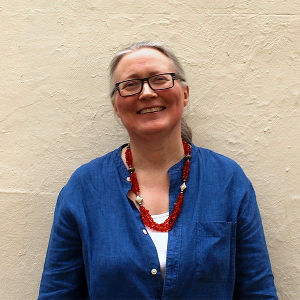 Hi and thank you so much for having me on your blog. I am the author of eight books. My most recent is The Return of the Courtesan (hardback title Titian’s Boatman) set partly in sixteenth century Venice and partly in 21st century London and New York. It was listed in the top ten books set in Venice on The Venice Insider website last year. Before that I wrote a crime series set in Oxford and London figuring a private investigator Sam Falconer. I have also written two true crime books for the National Archives: one about Ruth Ellis, the last woman to be hanged in England and one on Florence Maybrick, a Victorian arsenic poisoner. My historical novel Far Away, set in Italy during the Second World War, was short listed for the 2016 Historical Novel Society Indie award. I live in London. I studied history at Oxford and have worked in law, publishing and bookselling.
Hi and thank you so much for having me on your blog. I am the author of eight books. My most recent is The Return of the Courtesan (hardback title Titian’s Boatman) set partly in sixteenth century Venice and partly in 21st century London and New York. It was listed in the top ten books set in Venice on The Venice Insider website last year. Before that I wrote a crime series set in Oxford and London figuring a private investigator Sam Falconer. I have also written two true crime books for the National Archives: one about Ruth Ellis, the last woman to be hanged in England and one on Florence Maybrick, a Victorian arsenic poisoner. My historical novel Far Away, set in Italy during the Second World War, was short listed for the 2016 Historical Novel Society Indie award. I live in London. I studied history at Oxford and have worked in law, publishing and bookselling.
Who would you like to sit next to on a long flight?
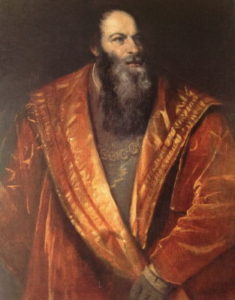 I would like to sit next to Pietro Aretino. He lived in Venice in the sixteenth century and was a great friend of the painter, Titian, both he and Titian figure in my book. One of the pleasures of researching the novel was reading Aretino’s letters. They are scurrilous, funny, and filled with the kind of details that novelists crave: his passion for salad, his gratitude at receiving an enormous cheese, advice to his gondolier never to marry, advice to Titian’s son to get back to his studies. He loved Venice and he loved Titian who he thought was a genius. He was a poet, a rogue, a chancer, a man of vast appetites. Hang on, maybe on second thoughts this isn’t such a good idea. How long is the flight going to be? God knows what he might get up to!
I would like to sit next to Pietro Aretino. He lived in Venice in the sixteenth century and was a great friend of the painter, Titian, both he and Titian figure in my book. One of the pleasures of researching the novel was reading Aretino’s letters. They are scurrilous, funny, and filled with the kind of details that novelists crave: his passion for salad, his gratitude at receiving an enormous cheese, advice to his gondolier never to marry, advice to Titian’s son to get back to his studies. He loved Venice and he loved Titian who he thought was a genius. He was a poet, a rogue, a chancer, a man of vast appetites. Hang on, maybe on second thoughts this isn’t such a good idea. How long is the flight going to be? God knows what he might get up to!
I would also like to sit next to the actor Lily Tomlin because I adore everything she’s ever been in including Grace and Frankie, series three of which is about to come back onto Netflix very soon. Hurrah! I think she’d also manage to keep Aretino in order. Maybe she’d drug him!
If your book takes place in the past what inspired you to write in this particular era.
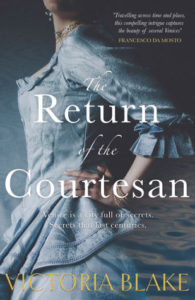 The Return of the Courtesan (aka Titian’s Boatman) takes place partly in sixteenth century Venice and the inspiration behind that was my love of a particular painting by Titian, The Man with the Blue Sleeve (aka A Man with a Quilted Sleeve and Portrait of Gerolamo (?) Barbarigo 1510), which currently hangs in Room 2 of the National Gallery in London. I tend to visit art galleries between books. At that stage I’m usually fed up with everything to do with writing but at the same time terrified I’ll never write another one.
The Return of the Courtesan (aka Titian’s Boatman) takes place partly in sixteenth century Venice and the inspiration behind that was my love of a particular painting by Titian, The Man with the Blue Sleeve (aka A Man with a Quilted Sleeve and Portrait of Gerolamo (?) Barbarigo 1510), which currently hangs in Room 2 of the National Gallery in London. I tend to visit art galleries between books. At that stage I’m usually fed up with everything to do with writing but at the same time terrified I’ll never write another one.
Standing in front of the painting I always found bracing because I imagined him being sarcastic about my neurotic state of mind and uttering caustic and completely unhelpful remarks. I can never make up my mind whether he’s about to smile or sneer. His expression seems to rest exactly between those two possibilities.
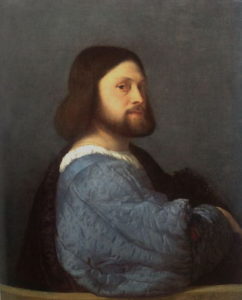 I had stood in front of this painting many times before I even realized it was by Titian. Then one day I read the notice next to it and it said that Titian painted him when he was about twenty years old. Wow, I thought, that’s young and so I started researching Titian, who was one of the geniuses of the Italian Renaissance and that was the beginning of my next book. I visited him the other day and his sleeve seemed much bluer than I remembered it and his expression much more friendly, so hopefully that denotes good things for the New Year!
I had stood in front of this painting many times before I even realized it was by Titian. Then one day I read the notice next to it and it said that Titian painted him when he was about twenty years old. Wow, I thought, that’s young and so I started researching Titian, who was one of the geniuses of the Italian Renaissance and that was the beginning of my next book. I visited him the other day and his sleeve seemed much bluer than I remembered it and his expression much more friendly, so hopefully that denotes good things for the New Year!
Who is your favourite character and why?
My favourite character in The Return of the Courtesan is Sebastiano da Canal, the gondolier. He’s cunning and patient and resourceful. I heard his voice incredibly clearly in my head right from the beginning and there was an earthiness and trickster energy to him I delighted in. In the book I follow him from being a young boy deep into his old age. Incidentally, I still do hear him. It’s interesting when a character’s voice continues beyond the confines of a book. At the moment there’s no indication that he’s going to shut up any time soon, so maybe my next book should be called The Return of the Gondolier!
What inspired you to be a writer?
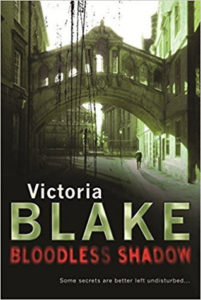 My father was a writer. He taught politics at Christ Church College Oxford and throughout his life he was writing, either books, lectures or journalism. He wrote a book which was viewed as being one of the best political biographies of the twentieth century, a biography of British Prime Minister Benjamin Disraeli. I think seeing him write must have had some kind of influence on me as a child although I’m slightly at a loss to pin down exactly what it was. Maybe it had something to do with being fascinated with his level of self-absorption and concentration and being curious as to where he had gone to when he was writing. It seems trite to say that I became a writer to gain a clearer understanding of who my father was but I feel there is probably some truth in that. Rather a weird thing happened with the publication of my first book, Bloodless Shadow, a crime novel set in Oxford. My father died in September and my book came out the following January. The cover shows a man walking away under Hertford Bridge in Oxford. Incidentally the bridge is also known as the Oxford Bridge of Sighs after the one in Venice. The bridge spans a road which leads to where we lived when I was a child and the back view of the man is rather like my father. It was a weird moment when I first set eyes on it!
My father was a writer. He taught politics at Christ Church College Oxford and throughout his life he was writing, either books, lectures or journalism. He wrote a book which was viewed as being one of the best political biographies of the twentieth century, a biography of British Prime Minister Benjamin Disraeli. I think seeing him write must have had some kind of influence on me as a child although I’m slightly at a loss to pin down exactly what it was. Maybe it had something to do with being fascinated with his level of self-absorption and concentration and being curious as to where he had gone to when he was writing. It seems trite to say that I became a writer to gain a clearer understanding of who my father was but I feel there is probably some truth in that. Rather a weird thing happened with the publication of my first book, Bloodless Shadow, a crime novel set in Oxford. My father died in September and my book came out the following January. The cover shows a man walking away under Hertford Bridge in Oxford. Incidentally the bridge is also known as the Oxford Bridge of Sighs after the one in Venice. The bridge spans a road which leads to where we lived when I was a child and the back view of the man is rather like my father. It was a weird moment when I first set eyes on it!
What are you passionate about other than your writing?
I’m passionate about human rights. I volunteer once a week at the Amnesty International Bookshop in Hammersmith, London. I love it. I find it incredibly satisfying to go rummaging through our donated second-hand books and put out on the tables items I think will interest and tempt our customers. Any Elena Ferrante novels always go quickly and last week a copy of Neruda’s poems and a complete set of Walt Whitman’s poems. Selling books can sometimes seem a lot simpler and more satisfying than working out my plot! It’s also a very good antidote to the more self-involved aspects of writing.
Tell me something about yourself that has nothing to do with writing.
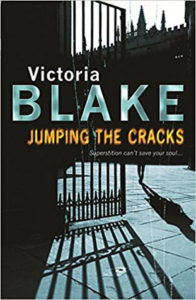 I was brought up from the age of six to eighteen in an Oxford college – Queen’s because my father was the Provost. It was a strange upbringing. One of the students at the college during that time was the actor Rowan Atkinson (Blackadder, Mr Bean and now Maigret!) and he appeared in a play in our garden called the Dog beneath the Skin by WH Auden. He played the dog! The garden was much in demand by student theatre groups because it had a seventeenth library at the end of it which created a beautiful backdrop. Another student there during that time was Tim Berners-Lee, so it’s likely that at some point between 1973 and 1976 I handed the future inventor of the World Wide Web a sausage on a stick, at one of the parties my parents had for undergraduates!
I was brought up from the age of six to eighteen in an Oxford college – Queen’s because my father was the Provost. It was a strange upbringing. One of the students at the college during that time was the actor Rowan Atkinson (Blackadder, Mr Bean and now Maigret!) and he appeared in a play in our garden called the Dog beneath the Skin by WH Auden. He played the dog! The garden was much in demand by student theatre groups because it had a seventeenth library at the end of it which created a beautiful backdrop. Another student there during that time was Tim Berners-Lee, so it’s likely that at some point between 1973 and 1976 I handed the future inventor of the World Wide Web a sausage on a stick, at one of the parties my parents had for undergraduates!
What are you working on now?
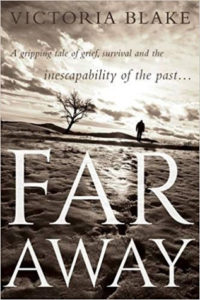 At the moment I’m working on a historical crime novel set in Oxford during the English Civil War (1643). It is probably the least like itself that Oxford ever was and I find that fascinating. King Charles made Oxford his capital and so the court came to town, the dons and students were thrown out of the colleges and courtiers and their families, including women and children, took over their rooms. Students were either sent home or enlisted to fight for the king. The city was incredibly crowded and chaotic. I’ve got a great book which lists the occupancy of many of the houses round Christ Church at the time and it includes people like the king’s doctors and his pastry chefs. The city was put under tremendous stress, the sewers overflowed, the rubbish piled up in the streets, soldiers fought each other and disease was rampant. Oxford is a city I know very well so to come across it at this point in its history when it was so very unlike its usual cerebral self is fascinating although I have to be careful in my research. For example some of the beautiful buildings that Oxford is famous for now like The Radcliffe Camera, The Sheldonian and Tom Tower of Christ Church did not exist then. It’s interesting to think that the Turf Tavern, a very famous Oxford pub, (drunk in by amongst others Bill Clinton and fictional detective, Morse) was still there but operating under the name of The Spotted Cow. A better name I think!
At the moment I’m working on a historical crime novel set in Oxford during the English Civil War (1643). It is probably the least like itself that Oxford ever was and I find that fascinating. King Charles made Oxford his capital and so the court came to town, the dons and students were thrown out of the colleges and courtiers and their families, including women and children, took over their rooms. Students were either sent home or enlisted to fight for the king. The city was incredibly crowded and chaotic. I’ve got a great book which lists the occupancy of many of the houses round Christ Church at the time and it includes people like the king’s doctors and his pastry chefs. The city was put under tremendous stress, the sewers overflowed, the rubbish piled up in the streets, soldiers fought each other and disease was rampant. Oxford is a city I know very well so to come across it at this point in its history when it was so very unlike its usual cerebral self is fascinating although I have to be careful in my research. For example some of the beautiful buildings that Oxford is famous for now like The Radcliffe Camera, The Sheldonian and Tom Tower of Christ Church did not exist then. It’s interesting to think that the Turf Tavern, a very famous Oxford pub, (drunk in by amongst others Bill Clinton and fictional detective, Morse) was still there but operating under the name of The Spotted Cow. A better name I think!
What do you wish I’d asked you?
How do you keep going? I’ve just seen the film The Darkest Hour about Churchill with Gary Oldman playing Churchill. At the end of the film there’s the following quote that rang a lot of bells with me. “Success isn’t final, failure isn’t fatal: it’s the courage to continue that counts.” I think there’s great kindness and common sense in that quote and I immediately went home, wrote it out and stuck it up on my desk. A good quote for January!
Thank you, Victoria! It was a pleasure to feature you on my blog today. Best of luck with your work-in-progress!
You can connect with Victoria Blake on Facebook, Twitter or her website. Her books are available on Amazon UK, Amazon US, many fine bookstores and most online retailers.
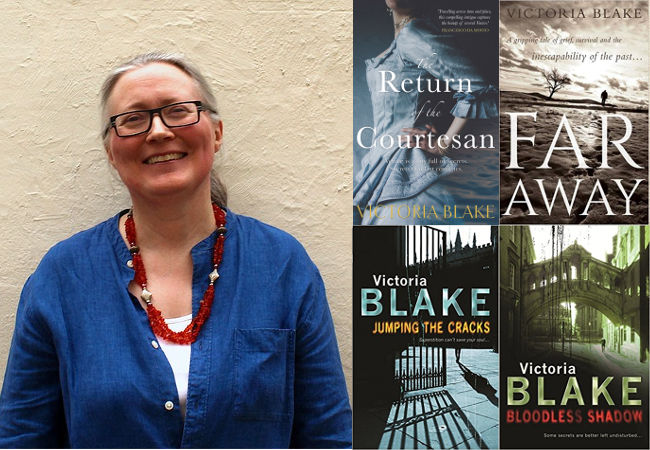
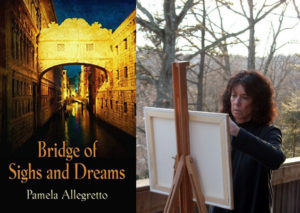
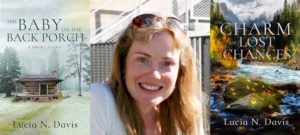
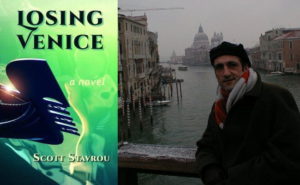
Pingback: Spotlight On… – Jennifer S. Alderson
I enjoyed this intelligent, fascinating interview with the intelligent fascinating author, Victoria. Fortunately I learned about Victoria a while ago through another blogger, who reviewed The Return of the Courtesan in such glowing terms that I immediately ordered it and read it. And agreed. It’s a wonderful book that I have recommended to many others. Thanks for interviewing Victoria, Jennifer. I learned even more here, and I love that quote from the Churchill movie, Victoria. I find it wise and helpful.
Hi Pamela, interviewing her was a treat for me, as well! I’m glad you enjoyed this post and her novel. Thanks for stopping by!
Thanks Pam – how sweet of you! And thanks so much for your support of the book. It’s hugely appreciated!
Thank you for the interview with Vicky. If she can make Oxford come alive in all its glory as she did Venice, then we are all in for a treat. Maybe ‘glory’ isn’t quite the right word when the sewers are overflowing, although ‘covered in glory’ it was my mother’s preferred expression for being up to your elbows in the proverbial.
Hi Keir Lusby, I agree! I’m also looking forward to reading her descriptions of Oxford in the 1600s. I enjoyed reading about the contemporary city and Pitt Rivers Museum in her novel Jumping the Cracks. Thanks for stopping by!
Hi Keir and thank you for your very kind comments. As you are probably discovering right now the work in progress needs some work!
It was very inspiring to read my cousin Victoria’s interview here. Many thanks for this.
It was my pleasure to interview Victoria about her fascinating life and writing inspirations! Thanks for stopping by, Michael Ivy.
Mike, hello, how are you? Thank you for reading this and commenting. Very glad you enjoyed it!
I enjoyed this author interview, and walk away mulling Churchill’s thought that the courage to continue is what counts, more than success or failure.
Hi Eva I’m glad you enjoyed it. The film was a bit of a mixed bag for me but I loved that quote!
Thanks for stopping by, Eva! I liked what you said on Facebook as well, about this being such an important quote for writers to remember – it is about staying the course for the long haul, and not getting caught up worrying about short-term successes or failures.
What an interesting article and looking forward to ‘visiting’ 17th Century Oxford. And what a great quote from The Darkest Hour to finish on!
Her work-in-progress does sound captivating! Thanks for stopping by, TripFiction
Thanks Trip Fiction and also for all your support of my book!
Pingback: Q&A with author Jennifer Alderson | victoria blake